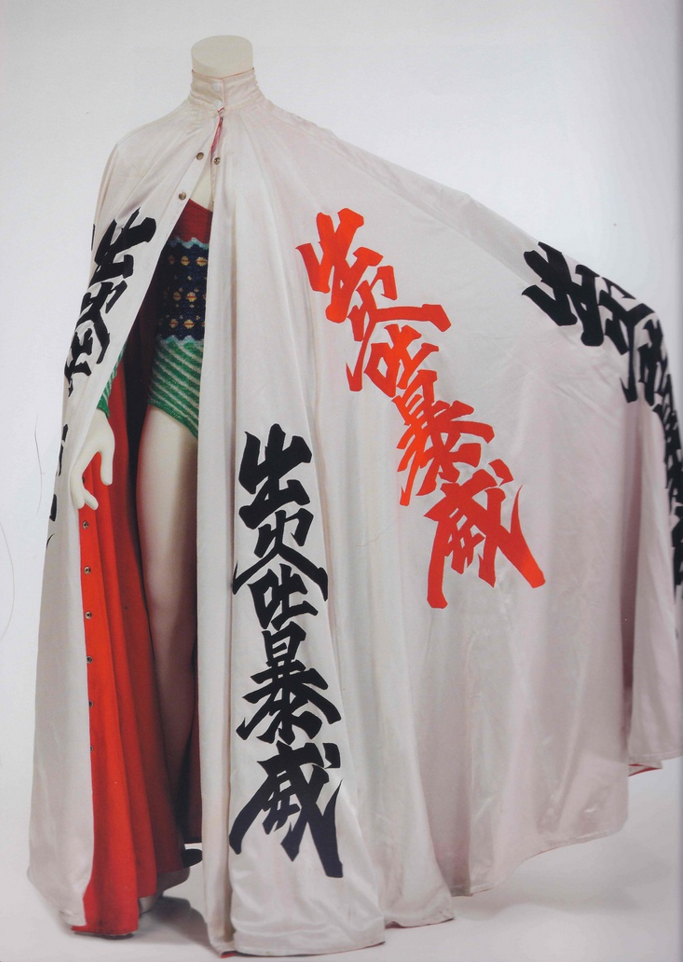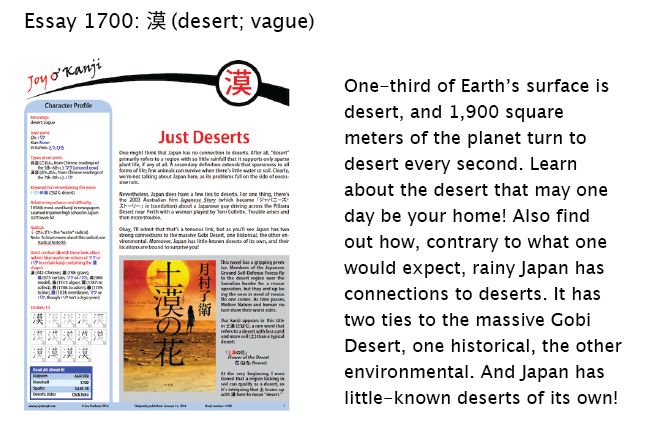David Bowie and the Blues
David Bowie's death kicked off a week of losses, but it also brought to light something that many of us knew nothing about—his fascination with Japan. In particular, during performances he sometimes wore a kimono-inspired cape covered with five kanji:

Here's a quiz for you: What are the kanji?
I'll block the answer with a preview of the newest essay:

Okay, here are the kanji:
出火吐暴威
They mean "fiery vomiting and venting in a menacing manner"! They also represent his name phonetically. How do they do that?

Here are the corresponding kun-yomi and on-yomi that approximate "David Bowie":
出 で
火 び
吐 ト
暴 ボウ
威 イ
That isn't the usual way of representing "David" in Japanese. For one thing, the third kanji gives us ト, not ド. Most people write "David" as デビッド.
For more on Bowie's Japanophilia, check this BBC article.
Here's another quiz for you: What do you think がんばる低木 means? Little trees that do their best?!
This question comes to you from the newly released essay 1700, which discusses 砂漠化 (さばくか: desertification) and includes this book title:
「砂漠化と戦う植物たち がんばる低木」
Plants That Fight Desertification: Shrubs That Stand Firm
戦う (たたかう: to fight); 植物* (しょくぶつ: plants); -たち (pluralizing suffix); がんばる (standing firm); 低木 (ていぼく: shrubs)
Ah, shrubs that stand firm! Now the phrase makes more sense!
The photos above are of another beautiful spirit who left the world this week—my dog Kanji. My constant companion for 10 years, he brought boundless joy into our household, and now it feels as if we've lost the center of our lives.
It just so happens that essay 1700 includes something that feels relevant. That is, the great scholar, poet, and politician Michizane Sugawara (菅原道真, すがわら みちざね: 845–930, in which 菅 is non-Joyo) wrote a long Chinese poem after his friend’s death, using 冥漠 (めいばく: dim and distant) to mean “the world after death” or "heaven."
Translated into modern Japanese, the poem no longer contains 漠 or even looks much like a poem, but it does a beautiful job of expressing what we feel when a much-loved being slips beyond our reach:
君は今や冥土の客となったので再び懐かしい容姿を見る由もない。また、便りを差し上げる術もなくなった。悲しいことである。
You’ve already gone to heaven. I can’t see you again. Moreover, there’s no way to send you letters anymore. What sorrow.
君 (きみ: you); 今や (いまや: now, esp. in contrast with the past); 冥土 (めいど: the other world); 客 (きゃく: visitor); 再び (ふたたび: again); 懐かしい (なつかしい: dear, desired, missed); 容姿 (ようし: (physical) appearance); 見る (みる: to see); 由もない (よしもない: to have no way of doing); 便り (たより: letter); 差し上げる (さしあげる: to give); 術 (すべ: means, way); 悲しい (かなしい: sad)
Have a great weekend. And may next week be free from tragedy.



Comments